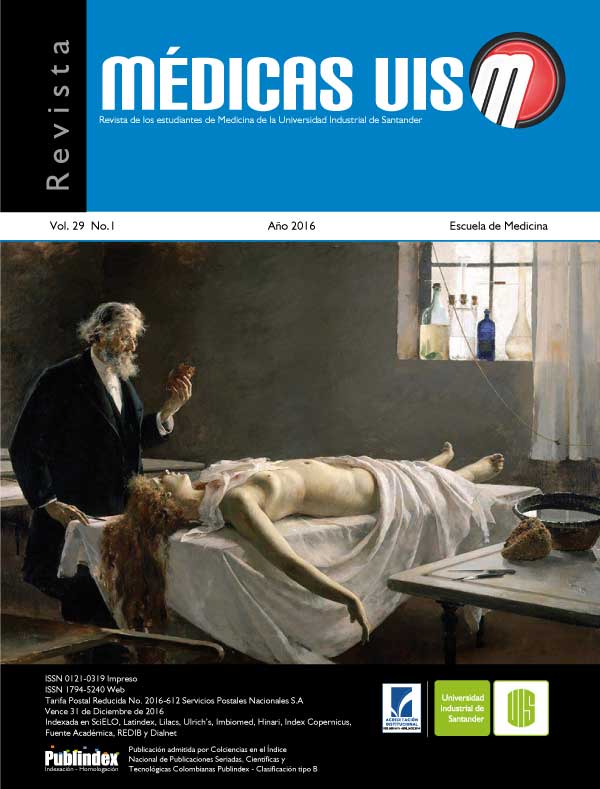Abstract
ABSTRACT
Introduction: chemical Burns are serious injuries due to their high potential to cause local and systemic damage. They represent between 2.4% and 10.7% of the patients admitted to burn units, and have an associated mortality of 30%. The available literature on Latin America is scarce. Objective: the main objective of the study is to determine the epidemiological and clinical characteristics of patients with chemical burns treated at Hospital Universitario de Santander burn unit, in Bucaramanga, Colombia. Methods: this was an observational, descriptive, and retrospective study, which included patients who presented with burns by chemical agents between January 1, 2009 to December 31, 2014; 29 patients were included. Results: chemical burns accounted for 1.5% of all burns; 17 cases were male gender; all were II and III degree burns; total body surface did not exceed 25%. The most affected site was the upper limb; there was a greater association with work related accidents with 16 cases; acids were the principal chemical agent involved with 17 cases and there was encountered 5injuries by assault; 19 patients required surgical intervention. Conclusions: chemical burns represent a small but significant percentage of burns, there is a clear association to accidental situations due to lack of training in the proper handling of chemicals, raising the need for primary prevention measures. MÉD.UIS. 2016;29(1):11-6.
Keywords: Epidemiology. Chemical burns. Burn Unit
References
Ramírez-Rivero CE, Ramírez-Blanco CE, Ramírez-Blanco N, Ramírez-Blanco MA. Manejo del paciente quemado. Rev. Univ. Ind. Santander. Salud. 2007;39(2):124-136.
Palao R, Monge I, Ruiz M, Barret JP. Chemical burns: Pathophysiology and treatment. Burns. 2010;36(3):295–304.
Hardwicke J, Hunter T, Staruch R, Moiemen N. Chemical burns- -an historical comparison and review of the literature. Burns. 2012;38(3):383–7.
Ramirez-Rivero CE, Ramírez-Blanco CE, Ramírez N, Butz DR. Epidemiología de la Unidad de Quemados del Hospital Universitario de Santander. RCCP. 2008;14(1):15-23. bien
Ramírez-Rivero C, Ramírez-Blanco C, Ramìrez-Blanco MA, Ramírez-Blanco N. Fisiopatología del paciente quemado. Rev. Univ. Ind. Santander. Salud. 2010;42(1):55-65.
Pitkanen J, Al-Qattan MM. Epidemiology of domestic chemical burns in Saudi Arabia. Burns. 2001;27(4):376–8.
Iribarren B. Osvaldo, Gonzales G. Claudio. Quemaduras por agentes químicos. Cuad. cir. (Valdivia). 2001;15(1):61-69.
Robinson EP, Chhabra AB. Hand chemical burns. J Hand Surg.Am. 2015;40(3):605–12; quiz 613.
Ricketts S, Kimble FW. Chemical injuries: The Tasmanian BurnsUnit experience. ANZ J Surg. 2003;73(1-2):45–8.
Wei Li, Xiaofeng Wu, Chengjin Gao. Ten-year epidemiological study of chemical burns in Jinshan, Shanghai, PR China. Burns.
;39(7):1468–73.
Ramakrishnan K.M, Mathivanan T, Jayaraman V, Babu M, Shankar J. Current scenario in chemical burns in a developing country: Chennai, india. Annals of Burns and Fire Disasters. 2012;15(1):8-12.
Hemmat Maghsoudi, Nasibeh Gabraely. Epidemiology and outcome of 121 cases of chemical burn in East Azarbaijan province, Iran. Injury. 2008;39(9):1042-6.
Youfu Xie a. Yanyan Tan a. Shuze Tang. Epidemiology of 377 patients with chemical burns in Guangdong province. Burns. 2004;30:569–572.
D’Cruz R. Pang TCY. Harvey JG. Holland AJA. Chemical burns in children: Aetiology and prevention. Burns. 2015;41:764–9.
Kay M. Wyllie R. Caustic ingestions in children. Curr Opin Pediatr. 2009;21(5):651–4.
Mannan A. Ghani S. Clarke A. Butler PEM. Cases of chemical assault worldwide: a literature review. Burns. 2007;33(2):149–54.
Protocolo de Atención Integral de Urgencias a Víctimas de Agresiones por Químicos. Abril de 2014. Disponible en: http://www.consultorsalud.com/sites/consultorsalud/files/Protocolo%2520atencion%2520urgencias%2520ataques%2520quimicos%25202014%2520Minsalud.pdf
Gaviria-Castellanos JL. Gómez-Ortega V. Gutiérrez P. Quemaduras químicas por agresión: características e incidencia recogidas en el Hospital Simón Bolívar, Bogotá, Colombia. Cir Plástica Ibero Latinoam. 2015;41(1):73–82.
Guerrero L. Burns due to acid assaults in Bogotá, Colombia. Burns. 013;39(5):1018–23.
